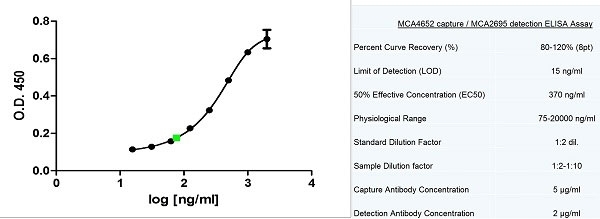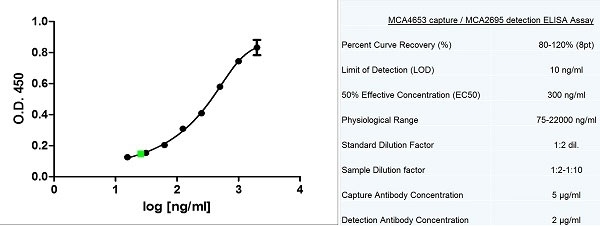Adiponectin


Recombinant Human Adiponectin
- Product Type
- Recombinant Protein
- Specificity
- Adiponectin
| Recombinant Adiponectin producted in Hi5 cells derived from the cabbage looper moth Trichoplusia ni corresponds to amino acids 19-244 of the human adiponectin precurson and containing an N-terminal histidine tag. Adiponectin is an adipokine exclusively secreted by adipocytes, which plays a major role in the control of fat metabolism and insulin sensitivity, through the regulation of energy homeostasis and glucose and lipid metabolism. A reduced level of plasma adiponectin is associated with type 2 diabetes and obesity insulin resistance. Adiponectin is an abundant protein in normal serum corresponding to approximately 0.1% of the total protein content. |
- Target Species
- Human
- Product Form
- Purified recombinant protein - lyophilized
- Reconstitution
- Reconstitute with 25 ul distilled water. Care should be taken during reconstitution as the protein may appear as a film at the bottom of the vial. Bio-Rad recommend that the vial is gently mixed after reconstitution.
- Preparation
- Purified recombinant adiponectin expressed in High-5 insect cells using a baculovirus expression system
- Source
- High-5
- Buffer Solution
- 10mM TRIS, pH 8.5
75mM L-Arginine - Preservative Stabilisers
- None present
- Carrier Free
- Yes
- Activity
- Determined by a cytotoxic assay using M1 cells. The ED50 for this effect is 3.0-6.0 μg/ml.
- Purity
- >97% by SDS PAGE and HPLC
- Approx. Protein Concentrations
- 1.0 mg/ml after reconstitution
- Protein Molecular Weight
- 26 kDa (226 amino acid residues)
- Endotoxin Level
- < 1.0 EU/ug
- Regulatory
- For research purposes only
- Guarantee
- Guaranteed for 3 months from the date of reconstitution or until the date of expiry, whichever comes first. Please see label for expiry date.
After reconstitution store at -20oC.
Storage in frost-free freezers is not recommended. This product should be stored undiluted. Avoid repeated freezing and thawing as this may denature the antibody. Should this product contain a precipitate we recommend microcentrifugation before use.
| Application Name | Verified | Min Dilution | Max Dilution |
|---|---|---|---|
| ELISA | |||
| Functional Assays |
- Synonyms
- ADIPOQ
- UniProt
- Q15848
- Entrez Gene
- ADIPOQ
- GO Terms
- GO:0005125 cytokine activity
- GO:0005179 hormone activity
- GO:0005615 extracellular space
- GO:0006006 glucose metabolic process
- GO:0006091 generation of precursor metabolites and energy
- GO:0006635 fatty acid beta-oxidation
- GO:0009749 response to glucose stimulus
- GO:0010739 positive regulation of protein kinase A signaling cascade
- GO:0010745 negative regulation of macrophage derived foam cell differentiation
- View More GO Terms
- GO:0010804 negative regulation of tumor necrosis factor-mediated signaling pathway
- GO:0010875 positive regulation of cholesterol efflux
- GO:0046326 positive regulation of glucose import
- GO:0030853 negative regulation of granulocyte differentiation
- GO:0032720 negative regulation of tumor necrosis factor production
- GO:0033034 positive regulation of myeloid cell apoptosis
- GO:0034115 negative regulation of heterotypic cell-cell adhesion
- GO:0034383 low-density lipoprotein particle clearance
- GO:0034612 response to tumor necrosis factor
- GO:0042593 glucose homeostasis
- GO:0042803 protein homodimerization activity
- GO:0043124 negative regulation of I-kappaB kinase/NF-kappaB cascade
- GO:0043499 eukaryotic cell surface binding
- GO:0045599 negative regulation of fat cell differentiation
- GO:0045650 negative regulation of macrophage differentiation
- GO:0045715 negative regulation of low-density lipoprotein particle receptor biosynthetic process
- GO:0045721 negative regulation of gluconeogenesis
- GO:0045923 positive regulation of fatty acid metabolic process
- GO:0050728 negative regulation of inflammatory response
- GO:0050765 negative regulation of phagocytosis
Please Note: All Products are "FOR RESEARCH PURPOSES ONLY"
View all Anti-Human ProductsAlways be the first to know.
When we launch new products and resources to help you achieve more in the lab.
Yes, sign me up
